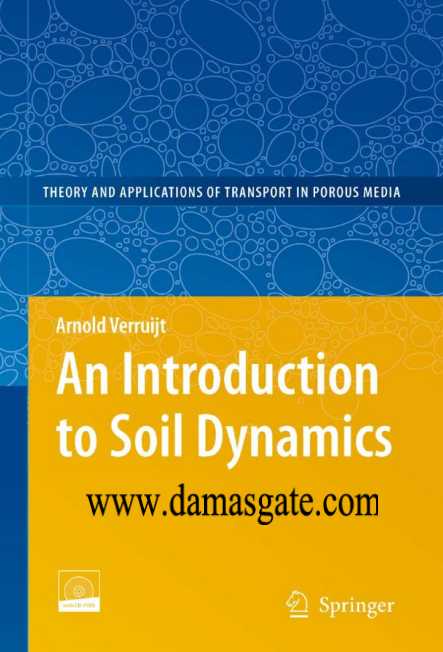An Introduction to Soil Dynamics Theory and Applications of Transport in Porous Media

Preface
This book gives the material for an introductory course on Soil Dynamics, as given
for about 10 years at the Delft University of Technology for students of civil engineering,
and updated continuously since 1994.
The book presents the basic principles of elastodynamics and the major solutions
of problems of interest for geotechnical engineering. For most problems the full analytical
derivation of the solution is given, mainly using integral transform methods.
These methods are presented briefly in Appendix A. The elastostatic solutions of
many problems are also given, as an introduction to the elastodynamic solutions,
and as possible limiting states of the corresponding dynamic problems. For a number
of problems of elastodynamics of a half space exact solutions are given, in closed
form, using methods developed by Pekeris and De Hoop. Some of these basic solutions
are derived in full detail, to assist in understanding the beautiful techniques
used in deriving them. For many problems the main functions for a computer program
to produce numerical data and graphs are given, in C. Some approximations
in which the horizontal displacements are disregarded, an approximation suggested
by Westergaard and Barends, are also given, because they are much easier to derive,
may give a first insight in the response of a foundation, and may be a stepping stone
to solving the more difficult complete elastodynamic problems.
The book is directed towards students of engineering, and may be giving more
details of the derivations of the solutions than strictly necessary, or than most other
books on elastodynamics give, but this may be excused by my own difficulties in
studying the subject, and by helping students with similar difficulties.
The book starts with a chapter on the behaviour of the simplest elementary system,
a system consisting of a mass, supported by a linear spring and a linear damper.
The main purpose of this chapter is to define the basic properties of dynamical systems,
for future reference. In this chapter the major forms of damping of importance
for soil dynamics problems, viscous damping and hysteretic damping, are defined
and their properties are investigated.
Chapters 2 and 3 are devoted to one dimensional problems: wave propagation in
piles, and wave propagation in layers due to earthquakes in the underlying layers, as
first developed in the 1970s at the University of California, Berkeley. In these chapters
the mathematical methods of Laplace and Fourier transforms, characteristics,
Download
http://s18.alxa.net/s18/srvs2/01/An....rous.Media.rar